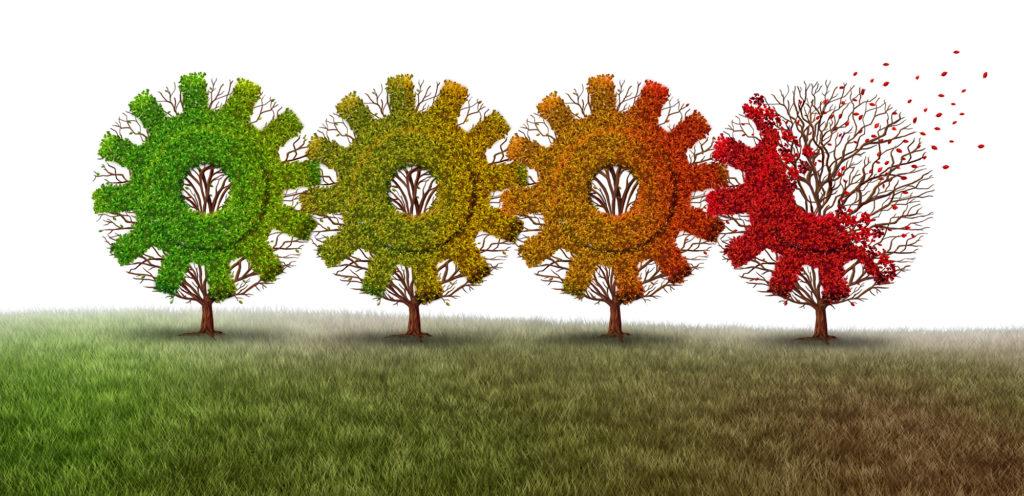
Ready or not, winter will approach soon! With the new season, the days grow shorter and the weather will change. What do most people do before new seasons begin? Most people prepare. Failure to prepare can have varying degrees of short- and long-term consequences.
History shows us that the economy cycles through “seasons” – transitioning from economic expansions or booms (the good) into economic contractions or recessions (the bad). I believe that during times of economic contractions or recessions, controlling your emotional responses and investment decisions can be more impactful than that from decisions made during boom times.
Benjamin Graham, known as the Father of Value Investing, said, “Individuals who cannot master their emotions are ill-suited to profit from the investment process.” Practically everything is intertwined with, is affected by, or has association with economic cycle. For example, economic cycles can be the rise and fall of:
- Global stock market indexes
- Global interest rates and the respective corporate and government bond markets
- Commodity (grain, coffee, copper, corn, oil, steel, etc.) markets
- United States Federal Reserve fiscal and monetary policies (and other sovereign government central bank policies)
The list can go on and on, though you get the picture.
Acknowledging economic cycles exist helps investors prepare. Remember the adage, “It was not raining when Noah built the Ark.” Investors may enjoy this approach as it may help:
- Gain clarity on how your portfolio may be negatively impacted using historical performance as a guidepost.
- Understand those historical outcomes to see if this is within risk tolerance you can accept.
- Predetermine the rationally-derived actions or strategies you may enact BEFORE the next economic phase in the cycle may begin aimed at limiting large drawdown risks.
- Reduce the potential stress and any emotional investment decision making.
Preparing for the different “seasons” aims to reduce stress. A new study from Johns Hopkins suggests that “cumulative stress can have an outsize effect on women’s memories, pointing to a possible reason why women experience dementia and related illnesses at a much higher rate than men.”[i]
I have found investors who work through this process before determining their investment strategy often feel a higher level of comfort and experience less stress regarding their investment portfolio. This often leads an investor to have a more logical, intentional and less emotional approach to their family’s financial situation.
According to the National Bureau of Economic Research (NBER), the United States began its 124th month on October 1, 2019, continuing the longest-running expansion in our nation’s history based upon government data that has been maintained since 1854 or for 165 years. The second-longest U.S. economic expansion was 120 months set between March 1991 and March 2001.
It may be helpful to be aware of what occurred as the markets navigated through the economy during 2000-2002. Take a moment to recall how you felt, what were your emotions and what were the investment decisions you took?
For clarity, I am NOT suggesting the current economic cycle is nearing an end. Though I believe history suggests it is imperative that investors prepare for its eventual conclusion.
No two market cycles are the same. History shows the drivers that fueled the bulls run and the catalyst that ends it are always different. Though investor behaviors are often the same.
Many investment television personalities will have endless views on various metrics (yield curves, negative interest rates, ISMs, consumer and business confidence, etc.) telling their viewers why this or that statistic is not a good indicator. One thing I have found interesting and clear; the list of things they may tell you “don’t matter” is getting longer by the day.
Benjamin Franklin said, “Don’t put off until tomorrow what you can do today.”
If you have not prepared for the coming season, I think there is no better time than now to act. Please make time to do this now. Planning for change will not be something you will regret. Don’t be a boiling frog, immune to the slowly increased heat, not realizing you are boiling until it is too late. Only historians have the benefit of waiting for time to pass to declare a narrative for a certain time period. You don’t!

There will likely be many risks to monitor. Current risks that may be on your mind could be the US-China trade conflict, potential for Brexit without trade or political agreements in place, many global government bonds with negative yields, potential presidential impeachment, and whatever else catches your attention.
These and other risks can lead our emotions to get the better of us and override our rational side. Making decisions guided by our emotions can lead to less than ideal returns. A 2014 Vanguard study found that behavioral coaching had a larger impact on client return than any other practice, including asset location, rebalancing, spending strategies, and expense ratios.[ii]
If you need help preparing for the seasons, email JAMES.KNAPP@KNAPPADVISORY.COM.
James C. Knapp, AIF®, BFA™, CPFA®
Securities and advisory services offered through LPL Financial, a Registered Investment Advisor, Member FINRA/SIPC
All performance referenced is historical and is no guarantee of future results.
All indices are unmanaged and may not be invested into directly.
The economic forecasts set forth in this material may not develop as predicted.
Investing involves risk including loss of principal. No investment strategy or risk management technique can guarantee return or eliminate risk in all market environments.
[i] https://www.popsci.com/women-stress-memory-loss/; Popular Science, 8/6/19, Kat Eschner












































































